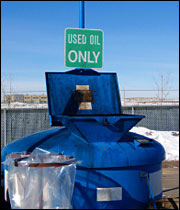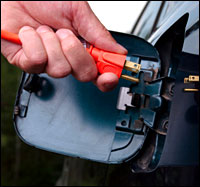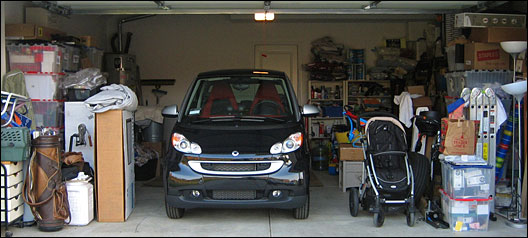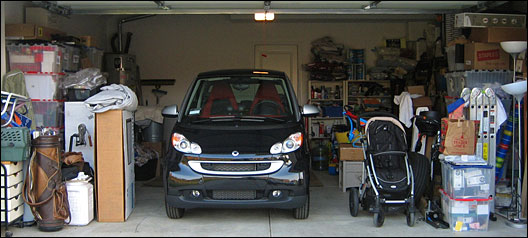Alt-rock band Weezer kept a Dungeon Master’s Guide, 12-sided die, and KISS posters there. Yours likely has a jumble of old tires, extension cords, motor oil, tire pumps, or camping gear. Not to get all SAT on you, but a garage is to a house what a junk drawer is to a kitchen: the messy catchall for random crap.
Just thinking about cleaning it up elicits a groan, and those of us who are vehicle-free aren’t exempt — somehow dusty cast-offs accumulate all the quicker sans automobile. But how to dispose of the paint cans, lawn spray, and used oil that surround your two- or four-wheeler? We can help you stop the gnarly chemical invasion … but we can’t help you with that garage band.
Here’s how to start.

Don’t be a dipstick, recycle your oil.
Level One: The Baby Step
Don’t be a land luber. You know what they say: Change your oil, change your life (or was that underwear?). If you’ve got used juice from an oil change kickin’ around, don’t use it for weed control or pour it down a storm drain, and don’t throw it away, even in a sealed container — dumping’s illegal in many states. Plus, oil runoff hurts the finned and could come back to bite you in seafood, not to mention tainted drinking water. One oil change’s worth of used oil can contaminate a million gallons of fresh water, so those heavy metals don’t rock. Put old oil in a clean plastic container that has never held other chemicals and take it to a repair shop for proper disposal. (Type your zip code and “used oil” into this locator to find one of the 30,000-plus places that will recycle it.) And use the recommended grade of motor oil in the first place — your trusty steel steed will guzzle less gas.
Level Two: The Next Steps
Do the can-can. Murphy’s Law dictates that remodeling projects require half as much paint as you actually bought. To store leftover paint safely, cover it with cling wrap before putting the lid on with a mallet (a hammer could dent it) and keep it away from pets and babies (and extreme temperatures). Older paint might have a high lead content, and latex paint from before 1990 may have mercury, so don’t, uh, drink it. Don’t put it in the garbage or down the drain either; it’s less than legal in some places. Instead, plug your zip code and “paint recycling” into Earth 911’s locator or, if it’s not puce-colored, consider donating it.
For future projects, this calculator (or a wise, splattered soul in the paint department of your local store) can help estimate how much you need. And next time, seal the deal with Green Seal-certified paints or other eco-friendly brands. If that’s too spendy, at least choose latex over oil; Earth911 says it’s less harmful to people and the planet. Or make your own — it’s way cheaper. Mother Earth News has instructions for two types of paint and an oil glaze.

Attack your lawn problems organically.
Green your green. You may be waging a war on weeds and bugs, but did you know that the origin of many insecticides and herbicides was nerve gas designed for war? Organophosphate insecticides boomed in popularity after DDT was banned in the ’70s, and other chemical baddies abound: 19 out of 30 commonly used lawn pesticides are linked with cancer, and 21 out of 30 have reproductive effects. A world of ick. So dump the pesticide habit — but not down the drain; that can eff with wastewater treatment systems. In some states, empty containers may be trashed after being triple-rinsed and wrapped in newspaper; as always, check your state’s guidelines. The EPA says your local health department, solid waste management authority, or enviro agency will be able to tell you about pesticide disposal in your community; smile without surprise if you need to take it to a commercial hazardous waste facility or save it for a hazardous household-waste collection day.
Instead of spreading toxic gunk on your lawn, opt for richer soil, as well as mowing high and often; watering less often but deeper; and raking some compost into your grass twice a year. (Your autumn leaves can be made into mulch, too.) This factsheet [PDF] can help identify weeds, their contributors, and natural remedies; organic options include milky spore powder, chinch bugs, and sod webworms. And sometimes luck be a ladybug.
Tool around without vinyl. Sure, you won’t be licking your rake, but the manufacture of its leaf-grabbing PVC fingers spews gunk like cancer-causing dioxins into the air, and once it’s raked its last, it releases more chemicals when incinerated (since PVC ain’t easily recyclable). Bad for you, animals, and the Earth. Instead, get a quality, long-lasting garden buddy made from aluminum or steel. The hose knows this problem too, but rubber alternatives to PVC hoses will last longer, and soaker hoses are even made out of recycled material. While you’re ditching equipment, downshift from gas-powered yard tools to old-school ones relying more on elbow grease. Think rake instead of leaf-blower, push mower instead of gas, and even a pair of sheep shears to replace your Weedwhacker. In these tight-waddy times, who isn’t looking to lower their electricity bill and spend less on gas?

Put a plug in it.
Level Three: The Big Steps
Plug it in. Sure, the Tesla Roadster ain’t exactly in the budget, but the industrious can convert their ride to electric with parts that won’t break the bank. Tips abound online. And Prius-driving do-it-yourselfers can retrofit their cars to run completely on electricity with 20 batteries, technical know-how, and a handful of other components. Bonus points for buying clean electricity to juice your EV, or for using solar panels mounted on your garage.
Throw it out. Take the plunge and ditch your car (hey, you knew that was coming). Enjoy having more space, saving money on gas and insurance, and belching less exhaust into the atmosphere. Check tax info to see if you can get a great end-of-the-year tax write-off by donating your car to charity. Habitat for Humanity, for instance, accepts cars and other vehicles cluttering up your life like RVs, trucks, boats, and motorcycles; those donations help their Cars for Homes program to build much-needed housing. And the sigh of relief that comes with simplifying your life? Invaluable.
Resources
Chemicals and car fluids
Ask Umbra on disposing of toxic chemicals
U.S. EPA’s used-oil management program
Earth911’s tips on recycling car fluids
Ask Umbra on electric cars
Grist on how to green your car
Paint disposal and eco-friendly paint
Ask Umbra on paint disposal
Ask Umbra on buying eco-friendly paint
Paint amount calculator
The Natural Paint Book
Yolo Colorhouse no-VOC paints
American Pride no-VOC paints
Gardening without pesticides
Beyond Pesticides
Tips for a natural lawn
Grist on how to green your yard — even more
Ask Umbra on organic pesticides
Ask Umbra on lawn mowers
Ask Umbra on fighting pests with pests
How old-school gardening can be green and gas-free
Donating your car to charity
Center for Car Donations
Habitat for Humanity’s Cars for Homes program
American Lung Association’s donateyourcar.com
Earth Share of Washington car donation program
Cars for Breast Cancer
Center for the Homeless car donation program
Animal Humane Society’s car donation program



